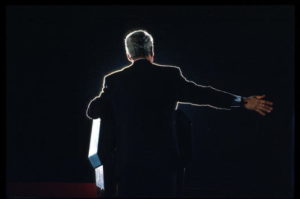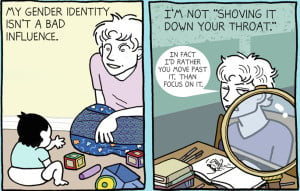When Trump supporter Helen Beristan’s husband – an undocumented Mexican immigrant – was deported last month, she was shocked, according to a recent interview by Washington Post reporter Peter Holley.
Beristain claimed that she thought Trump would hold true to his promise of only going after “bad hombres,” not her husband.
While reading this, I thought, “This is so freaking ridiculous.” This white woman really voted for someone whose virulent racism and xenophobia was an inherent part of his campaign – and then really thought her brown, immigrant spouse wouldn’t be affected by it?
It reminded me of the infamous tweet: “’I never thought leopards would eat my face,’ sobs woman who voted for the Leopards Eating People’s Faces Party.”
It seemed so obvious to me (and thousands of others I saw discussing it via social media), that despite not explicitly spelling it out, Trump was speaking about Mexicans and other Latinxs in his speeches about “drug lords” and “bad hombres.”
What I didn’t realize until further research was that he was using an old political tactic called dog-whistle politics.
In his book, Dog Whistle Politics: How Coded Racial Appeals Have Reinvented Racism & Wrecked the Middle Class, Ian Haney-López explains that dog whistling “simply means speaking in code to a target audience.”
According to Safire’s Political Dictionary, the Washington Post may have first used the term “dog whistle” in an article about political polling in 1988. It explained that “subtle changes” in poll wordings led to respondents understanding the questions differently than the researchers did.
Racial dog whistles are often sneakily used when politicians want to speak about race specifically to their target audience. The coded messages are used to reinforce racist ideas that the country’s societal and economic problems are because of undeserving, lazy, and violent people of color.
There are three aspects involved when politicians use racial dog whistles, according to Haney-López.
First, politicians force race into the conversation through “thinly veiled” racist remarks against people of color. Second, they make sure to not directly reference any one racial or ethnic group, so they can’t be accused of direct racism. And third, they shame any critics who try to call them out on the racist comments.
While Trump has been a master at using racial dog whistles to get in favor with white voters, he isn’t the only politician to ever use them.
Ever since the Republican “Southern Strategy” of the 1960s, many politicians have used racial dog whistles to appeal to white Americans, regardless of their politics. Racial dog whistles have even worked on white liberal and moderate voters, who might consciously be “against” racism, but still hold implicit biases.
So what are some other ways politicians, namely presidents, have employed racial dog whistles and how has it negatively impacted our communities?
Here are four major examples:
1. ‘Law and Order’
On the surface, the phrase “law and order” seems pretty non-threatening. Politicians who use it seem to be saying that their policies will focus on making sure the law will be upheld, and that any lawbreakers will be held accountable. What could be so bad about that?
The Dog Whistle: “Law and order” is often used to police low-income communities, particularly Black and Latinx people.
Politicians use the phrase to signal that people of color are inherently criminal, and that we defy laws for no good reason. It implies that extra measures, such as broken windows policing, which promotes harsh punishment strategies under the belief that tolerating minor infractions encourages more serious violent crimes, need to be implemented in order to uphold the law.
Famously Used By: Richard Nixon used the rhetoric of “law and order” in 1968 to appeal to white voters who were angry about integration. He claimed that he was a candidate for the “silent majority,” the other population of whites who weren’t protesting social injustices like Jim Crow and the Vietnam War.
In His Own Words: “[My campaign ad] hits it right on the nose. It’s all about law and order and the damn N*gro-Puerto Rican groups out there.”
How It Affects Us Today: With the exception of Trump saying we need more “law and order,” which would directly impact Black and Latinx neighborhoods, the phrase isn’t used much anymore. However, the message behind it still resonates with conservatives and liberals alike.
When groups like Black Lives Matter use civil disobedience, like when they shut down the 405 Freeway in Inglewood, CA last year, similar rhetoric to “law and order” was used to police their actions.
Liberals and conservatives alike objected to BLM because they claimed that the protests were “disrupting people’s lives” and “promoting rioting and violence.” In that case, upholding the status quo and obeying the law was the most important thing, instead of recognizing that the laws are unjust and need to be fixed.
2. The ‘Welfare Queen’
Devoid of context, “welfare queen” is a strange phrase. Without any context, it seems to be talking about a woman who receives government assistance. On its own, why would that be bad?
The Dog Whistle: Historically, the term “welfare queen” has been a commonly used stereotype against Black women.
It’s used to imply that Black women on social programs like welfare are lazy people who don’t do anything to “help themselves.” Instead, they have children to use up government money and the tax dollars of “hard-working” (read: white) Americans to live luxuriously.
Famously Used By: Ronald Reagan first hinted at this stereotype in 1976, while he was campaigning and promoting his anti-government assistance stance.
In Reagan’s speeches, he never explicitly used the term “Black” or “African-American.” Instead, he drew upon stereotypes of Black people, such as the “over sexualized woman” and the “violent big, Black buck” tropes, to draw the connection between race and criminality.
These speeches implied that Black people were criminals who refused to work. Instead, they tricked the government by abusing welfare systems to buy themselves extravagant things. One of his speeches in particular spoke about how frustrating it was to buy a hamburger at the grocery store, when someone on welfare could buy a T-bone steak.
In His Own Words: “She used eighty names, thirty addresses, [and] fifteen telephone numbers to collect food stamps, Social Security, veterans’ benefits for four nonexistent deceased veteran husbands, as well as welfare. Her tax-free cash income alone has been running $150,000 a year.”
How It Affects Us Today: Because of this rhetoric, an increasing amount of restrictions are placed on public assistance programs, many of which make it even more impossible for people to pull themselves out of poverty.
This is an issue because, as the Census Bureau data has proven, welfare programs are extremely effective. These programs aren’t a burden on society, but rather ways to help people and stimulate the economy.
These types of stereotypes about Black people “living off the government” still exist today and Black people are still demonized for needing public assistanc.
For instance, back in 2012, then-GOP candidate Rick Santorum stated he was against welfare because he didn’t “want to make Black people’s lives better by giving them somebody else’s money.” In 2015, Gene Alday, a Republican politician from Mississippi, claimed that “all the blacks are getting food stamps and what I call ‘welfare crazy checks…They don’t work.”
3. ‘Tough on Crime’
Saying “tough on crime” is pretty similar to saying “law and order.” Politicians who use it promise that they’ll enact policies that make the United States safer to live in. In theory, this should work for everyone – who wants to live somewhere that lets bad criminals go?
The Dog Whistle: “Tough on crime” is primarily used as a code for “tough on Black and Latinx people, who are dangerous!”
Tough-on-crime politicians are generally always in support of increased police presence and harsh punitive measures for “non-violent” crimes, which have historically not only put people of color in jails, but in many cases, have caused their murders at the hands of the police.
Famously Used By: Bill Clinton’s “tough on crime” speeches during his presidential campaigns in the 1990s were used to sway white voters toward the “New Democrats.” Unlike previous Democrats, Clinton’s campaign promises leaned more to the right and included his support for things, such as supporting the death penalty and increased welfare restrictions.
Clinton spoke about how it was important to crack down on “inner city” criminals in order to make the country safer. He later created policies such as the 1994 Violent Crime Control and Law Enforcement Act, which expanded measures that doled out harsh sentences.
Among other things, it increased funding for prisons and implemented a “three strikes” mandatory life sentence policy that locked up many Black and Latinx for minor offenses.
In His Own Words: “I can be nicked a lot, but no one can say I’m soft on crime.”
How It Affects Us Today: The policies that Clinton enacted negatively impacted Black communities and played a key role in molding mass incarceration as we know it today.
Civil rights lawyer and advocate Michelle Alexander explains in The New Jim Crow, “once again…a new system of racialized social control was created by exploiting the vulnerabilities and racial resentments of poor and working-class whites.”
Today, Black people are incarcerated 5.1 times the rate of white people, according to a report by The Sentencing Project.
4. ‘War on Terror’
This phrase evokes an image of the US military (and the nation) banding together to fight against all evils that threaten our liberty and justice. And who wouldn’t want to fight terror and defend our freedom?
The Dog Whistle: What isn’t explicit is that the “terror” that many politicians want us to go to war against are actually people of Arab and Muslim descent, who “for no reason at all,” hate everything the US stands for (like freedom and women’s rights).
Proponents of fighting the “war on terror” often push for more military funding, invasions into other countries, and stricter immigration laws – all in the name of keeping (white) Americans safe from evil Arab and Muslim people.
Famously Used By: Immediately after 9/11, George W. Bush declared we would be going to war with all terrorists capable of harming the US, and created a large-scale military campaign in order to do so.
In particular, Bush cited North Korea, Iraq, and Iran as countries that were hiding weapons of mass destruction and that actively trampled on their citizen’s rights. In his 2002 State of the Union address, he said these nations “constitute an axis of evil, arming to threaten the peace of the world.”
This also led to nationwide acts of racism, xenophobia, and Islamophobia against all people coded as Muslim and Arab. According to the FBI, hate crimes against Muslim people or people believed to be Muslim went up 1600% after 9/11.
In His Own Words: “Our war on terror begins with Al-Qaeda, but it does not end there. It will not end until every terrorist group of global reach has been found, stopped and defeated.”
How It Affects Us Today: Muslims, Sikhs, Arabs, South Asians, and people perceived to be members of these groups in the United States have been continuously stereotyped as anti-American terrorists and have been brutalized and forced to apologize for it.
Two Indian men, for instance, were shot in a Kansas bar in February by a white man who yelled, “Get out of my country!” The suspect gloated that he killed two Iranian men.
Last year, a new study released by California State University, San Bernardino found that hate crimes against Muslims were up 78% in 2015.
In addition to domestic hate crimes, the US continues to bomb countless Muslim-majority countries while simultaneously banning Muslim refugees from entering, all in the name of “keeping America safe.”
Just recently, the US military attacked Syria and Afghanistan in the name of “resisting terrorism.” And it hasn’t just happened under the current president. Under President Obama, there were more than 400 drone strikes in Pakistan, Yemen, and Africa from 2009 to 2015.
***
This is, of course, an incomplete list. There are countless numbers of racial dog whistles that politicians use to garner support for and win their campaigns.
Because racial dog whistles have become so ingrained in US politics, harmful stereotypes have, in a sense, become mainstream ideologies. They work to reinforce the idea that marginalized people are the problem.
When politicians use these coded messages, they continue to push fearmongering ideas and enact policies that are downright dangerous. It’s important that we continue to look for those underlying messages, and continue to call politicians out, no matter how much they deny being racist.
So keep on listening – that annoying buzzing you hear when President 45 speaks is probably him blowing a whistle.
[do_widget id=’text-101′]
Jennifer Loubriel is a Contributing Writer for Everyday Feminism and a mixed race Afro-Puerto Rican from the Bronx. She is also a queer mujerista and child abuse survivor. She earned her B.A. from Oberlin College in Religion and English, and identifies as an amateur Latinx ethicist and a speculative fiction enthusiast. She is a co-founder and moderator over at the Tumblr Women of Color, in Solidarity, a safe space for and by women of color. You can usually find her writing about apocalypse and diaspora, rewatching her favorite TV shows, or taking selfies with her family’s cat.
Search our 3000+ articles!
Read our articles about:
Our online racial justice training
Used by hundreds of universities, non-profits, and businesses.
Click to learn more





















